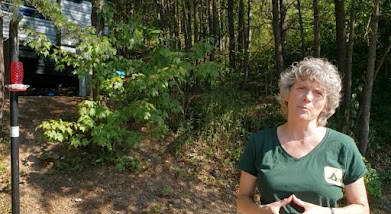The following article first appeared in the November newsletter from the Joint Legislative Air and Water Pollution Control and Conservation Committee.
By Sakura Ung, Joint Conservation Committee Project Manager
In Pennsylvania, it is against the law to engage in illegal dumping. Pennsylvania has several litter and illegal dumping laws such as the PA Vehicle Code, Title 75, Chapter 37 and the PA Crimes Code, Title 18, Chapter 65.
These laws prohibit citizens from improperly disposing of trash or property in areas such as on highways and in our waters. These laws are enforced by local police, the PA State Police, DCNR, DEP, Fish and Boat Commission, local code enforcement officers, local solid waste authorities and county health departments.
Individuals who violate litter and illegal dumping laws are subject to penalties including hefty fines and confiscation of property such as vehicles. Items often found at illegal dumpsites include tires, furniture, appliances, debris from construction and demolition and other household items.
PennDOT notes that the department spends nearly $600 per ton to cleanup a single illegal dumpsite -- and with thousands of illegal dumpsites located throughout the Commonwealth, the figure is staggering.
In February 2020, Keep Pennsylvania Beautiful released a study analyzing the cost of littering and illegal dumping in nine Pennsylvania cities including: Reading; Allentown; Philadelphia; Pittsburgh; and Harrisburg. Read more here.
The group found that the nine cities examined, “spend more than $68 million annually on cleanup, education, enforcement, and prevention efforts to address litter and illegal dumping.”
They also state that efforts to clean-up litter and illegal dumping accounts for 80 percent of the total cost reported for these cities.
Keep Pennsylvania Beautiful noted some of the reasons why individuals may engage in this intentional behavior in their publication titled, “Guidelines for Littering and Illegal Dumping Enforcement.”
The group cited “cost, convenience, ignorance, habit, profit, or to hide other illegal activities” as some of the motives. For example, people living in rural areas who are required to drive their trash to a site and pay per trash bag may want to save money.
Aside from the high cost of remedying illegal dumping, it adversely affects our economy, health and the environment - for reasons that are both obvious and startling.
Illegal dumping pollutes our waters and land; harms our natural resources and the animals that rely on them; increases populations of disease-ridden rodents and insects; decreases the property values in our communities; increases the likelihood of crime to occur in the area; deters prospective businesses and residents from settling down in our communities; and creates the opportunity for more illegal dumpsites to pop-up.
One particular group that is hard at work to combat illegal dumping is Monroe County’s Waste Authority Police Department.
The department is focused on addressing both short-term and long-term issues “associated with transportation, storage, processing, and disposal of municipal waste.”
In an article from the Philadelphia Inquirer titled, “Illegal trash dumping plagues rural Pennsylvania roadsides during pandemic,” Captain Jacqueline Bagu, a member of the Waste Authority Police Department, stated that, “We are, as far as I know, the only solid waste management authority that has an enforcement division like ours...”
The Waste Authority Police Department is run by Officer A. Cruz, Captain Jacqueline Bagu, as well as another officer and sergeant. The police department issues citations to individuals caught littering or illegally dumping.
The police department tracks these individuals down by responding to reports given to them by citizens and even searching through trash looking for pieces of information (i.e. mail) that can lead to the identity of the violator.
The department noted that it has seen an approximate 30 percent increase in illegal dumping in Monroe County during the COVID-19 pandemic. In addition, new residents coming to the area who are not familiar with trash collection policies and procedures in rural areas, as well as individuals illegally utilizing other companies’ dumpsters to throw away their garbage have contributed to the problem.
In addition, the Monroe County Municipal Waste Management Authority as a whole participates in several clean-up events and initiatives such as Keep Northeastern PA Beautiful.
The authority also established a standing Litter Committee comprised of Monroe County residents and individuals representing agencies and organizations such as PennDOT, the county conservation district and the county planning commission.
As proud Pennsylvanians, it is our duty to be mindful of the amount of trash we accumulate and to report any illegal dumping or littering that we may encounter.
Pennsylvania is fortunate to have groups like Keep Pennsylvania Beautiful, the Monroe County Municipal Waste Management Authority and the Waste Authority Police Department who are committed to eliminating litter and trash in our communities and educating citizens about its harmful impacts.
Click Here for more information about illegal dumping.
Click Here for more information about Keep Pennsylvania Beautiful’s litter cost study.
Click Here to read more about the efforts of the Monroe County Municipal Waste Management Authority and the Waste Authority Police Department.
Click Here to read the article from the Philadelphia Inquirer.
Other Articles
The November newsletter also includes articles on--
-- Policies To Prevent Over-Applying Fertilizer
-- Emissions From Asphalt Pavement
-- Mapping Migrations For Conservation
-- Plan For Shaft To Renewable Energy
Click Here to read the entire newsletter.
Rep. Parke Wentling (R-Mercer) serves as Chair of the Joint Conservation Committee.
For more information, visit the Joint Conservation Committee website, call 717-787-7570, Like them on Facebook or Follow them on Twitter. Click Here to sign up for regular updates from the Committee.
[Posted: November 30, 2020] PA Environment Digest






